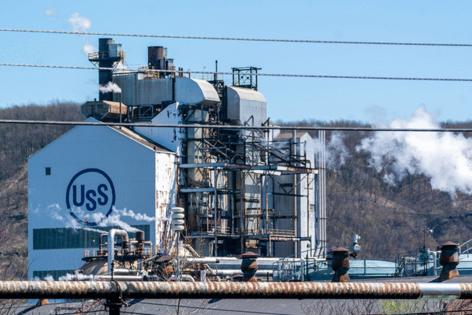After calling for a new review, Trump now says he opposes any US Steel deal to Japan
Published in Political News
Just two days after he ordered a new national security review of Nippon Steel Corp.'s bid to buy U.S. Steel Corp., President Donald Trump said on Wednesday that he does not want the iconic Pittsburgh steelmaker to be sold to a Japanese company.
"We love Japan, but U.S. Steel is a very special company," Trump said in the Oval Office late in the day while speaking to journalists as he signed a new wave of executive orders that varied from boosting the American shipbuilding industry to restoring higher pressure to shower heads. "We don't want it to go to Japan or any other place."
Trump had long opposed the proposed merger, first announced in December 2023, but his call on Monday for a new national security review by the Committee on Foreign Investment in the United States (CFIUS) sparked hope for a potential new avenue for the $14.9 billion deal.
Monday was also the deadline for the federal government to file its reply brief in a lawsuit that U.S. Steel and Nippon had filed challenging the previous CFIUS review, under the Joe Biden administration.
The Justice Department, instead, asked the court for a 60-day pause — 45 days for the new CFIUS review and 15 days for the president to weigh the committee's recommendations and make a decision on the deal.
U.S. Steel and Nippon agreed to the delay, according to the government's filing.
Perhaps the most optimistic forecast for the embattled deal came from an unlikely source: Ancora Holdings Group, the Cleveland-based investment firm that had been waging an aggressive proxy campaign to oust U.S. Steel's CEO David Burritt and install nine new directors to the company's board.
Ancora abruptly dropped the effort on Wednesday and took down its website, www.makeussteelgreatagain.com.
In a letter to shareholders, Ancora wrote: "Based on language included in Monday's Presidential Action, we suspect the companies have taken steps to try to mitigate national security considerations. We imagine this is why labor leaders, policy experts and stockholders have recently suggested they expect the sale will be approved."
Ancora had been urging U.S. Steel to postpone its annual meeting, scheduled for May 6, which would put it two weeks ahead of the completion of the CFIUS review.
During a news conference with Japanese Prime Minister Shigeru Ishiba in February, Trump said that he would like to see Nippon invest in U.S. Steel without buying it.
"They'll be looking at an investment rather than a purchase," Trump said on Feb. 7. "U.S. Steel is a very important company to us. It was the greatest company in the world for 15 years, many years ago, 80 years ago, and we didn't want to see that leave, and it wouldn't actually leave, but the concept psychologically [is] not good.
"So they've agreed to invest heavily in U.S. Steel, as opposed to own it. And that sounds very exciting," he added.
That language has become the dominant means of reframing the deal.
U.S. Steel's statement on Thursday echoed it.
"U. S. Steel and Nippon Steel are continuing to work closely with President Trump's Administration to secure a significant investment that will preserve existing jobs, create new jobs, enhance national security and secure a bright future for U. S. Steel and American steel manufacturing."
But during his press conference on Wednesday, Trump seemed to suggest that U.S. Steel may not even need Nippon's investment because the steel tariffs that his administration imposed on imports are boosting the domestic industry in spectacular fashion.
"I don't know if they need any money now, I'll be honest with you," he said. "They hit gold. Because if you look at... they have such orders for steel now that it's incredible."
U.S. Steel declined to comment on that.
On the presidential campaign trail, both Trump and Democratic nominee Kamala Harris said they opposed the deal because the company should remain American-owned. The United Steelworkers union has opposed the Nippon deal from its announcement.
Nippon had originally pledged to invest $2.7 billion in U.S. Steel's plants, including at least $1 billion in the Mon Valley. Last month, Nippon sweetened the deal by increasing its proposed investment in U.S. Steel facilities to $7 billion.
Trump's comments Wednesday came after a visit to the White House by Jason Zugai, a mobile equipment trainer at U.S. Steel's Irvin Works and vice president of USW Local 2227, who traveled there for the official announcement of Trump's tariffs on April 2, which the president called "Liberation Day."
He said he got a few minutes with Vice President JD Vance to talk about U.S. Steel and Nippon.
"He asked if we were for the deal," Mr. Zugai recalled. "I said yes," estimating that the vast majority of workers at Mon Valley plants were in favor.
"We need this deal to go through," Mr. Zugai said, back at work earlier this week. "Without these investments from Nippon, our facility won't last."
U.S. Steel's President and CEO David Burritt said in the fall that without the Japanese investment, American mills could close and U.S. Steel's headquarters might move out of Pittsburgh.
U.S. Steel has about 22,000 employees worldwide, with about 4,000 in this region.
_____
©2025 PG Publishing Co. Visit at post-gazette.com. Distributed by Tribune Content Agency, LLC.




























































Comments